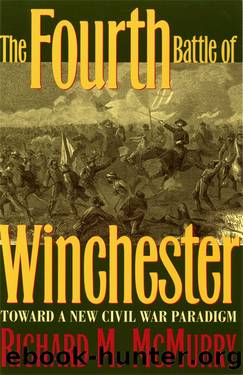The Fourth Battle of Winchester by Richard McMurry

Author:Richard McMurry [McMurry, Richard]
Language: eng
Format: epub
Tags: History, Military, Wars & Conflicts (Other), United States, State & Local, General
ISBN: 9780873387217
Google: CwYIQ5sPgbEC
Publisher: Kent State University Press
Published: 2002-01-15T03:34:41+00:00
That Elusive Turning Point
Many writers on the war, when not asserting, sometimes hysterically, that Gettysburg was the âdecisiveâ battle of the conflict, occupy themselves proclaiming that engagement to have been the âturning pointâ of the war. On rare occasions some will label another struggleâVicksburg, perhaps, or Shiloh, or even Atlantaâas the âturning point.â Books and seminars on the conflict have been devoted to a consideration of âthe turning pointsâ (my emphasis) of the war. Perhaps the Civil Warâs military turning point is similar to those subatomic particles that, the people who study quantum mechanics tell us, can be in two places at once. (Could âquantum historiansâ locate it/them?)
As was the case with the term âdecisive,â the expression âturning pointâ can be used on any one of several different levels. A Confederate victory such as that in the Seven Days Battle of 1862 reversed a tide in Virginia that was clearly beginning to run in favor of the Federals. A battle could also turn nonmilitary aspects of the North-South struggle into a new channelâone leading to the Emancipation Proclamation, for example. Turning points can also be found within a battle. âStonewallâ Jacksonâs stand at First Manassas on July 21, 1861, and Sheridanâs rallying the troops at the (actual) Battle of Cedar Creek stand as examples of this most limited of all kinds of military turning points. Finally, the words can be used in the highest sense to designate an event that diverted the overall military history of the war into a new channel. It is in this last sense that I apply the term here.
Viewing the war as a whole and considering the West as the area where the outcome of the conflict was determined, we can clearly see that the central military history of the war revolves around the story of Union armies marching from victory, to victory, to victory, to victory. This pattern held from the opening campaigns straight through to the final surrender of the Rebel armies. There was never a time when either the war in the West or the military events of the struggle taken as a whole were moving toward Confederate success or even hovering in neutral. There was, therefore, no overall military âturning pointâânot at Gettysburg nor anywhere else.
To be sure, potential military turning points occurred in the West from time to time. The best came in the late summer and fall of 1862 when Rebel armies were advancing deep into Kentucky and back into northern Mississippi and northwestern Arkansas. A year later another potential turning point materialized in the aftermath of the secessionistsâ victory at Chickamauga. Had the western Rebel generals managed to convert either of those great opportunities into a strategicâor even a significant tacticalâvictory, they might well have altered the course of the war in some way. As it was, however, they failed to achieve any meaningful success at Perryville, Iuka, Corinth, Prairie Grove, or Chattanooga. Absent Southern success on the western battlefields, the war continued along in its old military
Download
This site does not store any files on its server. We only index and link to content provided by other sites. Please contact the content providers to delete copyright contents if any and email us, we'll remove relevant links or contents immediately.
In Cold Blood by Truman Capote(3386)
The Innovators: How a Group of Hackers, Geniuses, and Geeks Created the Digital Revolution by Walter Isaacson(3211)
Steve Jobs by Walter Isaacson(2899)
All the President's Men by Carl Bernstein & Bob Woodward(2379)
Lonely Planet New York City by Lonely Planet(2227)
And the Band Played On by Randy Shilts(2210)
The Room Where It Happened by John Bolton;(2159)
The Poisoner's Handbook by Deborah Blum(2141)
The Innovators by Walter Isaacson(2106)
The Murder of Marilyn Monroe by Jay Margolis(2101)
Lincoln by David Herbert Donald(1989)
Being George Washington by Beck Glenn(1978)
A Colony in a Nation by Chris Hayes(1935)
Under the Banner of Heaven: A Story of Violent Faith by Jon Krakauer(1807)
Amelia Earhart by Doris L. Rich(1699)
The Unsettlers by Mark Sundeen(1692)
Dirt by Bill Buford(1682)
Birdmen by Lawrence Goldstone(1670)
Zeitoun by Dave Eggers(1654)
